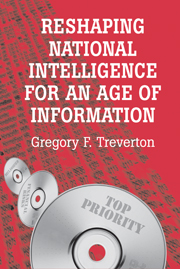Book contents
- Frontmatter
- Contents
- Foreword
- Preface
- Note on sources
- 1 The imperative of reshaping
- 2 The world of intelligence beyond 2010
- 3 The militarization of intelligence
- 4 Designated readers: the open source revolution
- 5 Spying, looking, and catching criminals
- 6 The intelligence of policy
- 7 A reshaped intelligence
- Index
2 - The world of intelligence beyond 2010
Published online by Cambridge University Press: 23 May 2010
- Frontmatter
- Contents
- Foreword
- Preface
- Note on sources
- 1 The imperative of reshaping
- 2 The world of intelligence beyond 2010
- 3 The militarization of intelligence
- 4 Designated readers: the open source revolution
- 5 Spying, looking, and catching criminals
- 6 The intelligence of policy
- 7 A reshaped intelligence
- Index
Summary
Intelligence is in an exquisitely awkward position in adapting to a changed world. It is a “service” industry, one designed to serve American foreign policy, but how can it do so when the definitions of American interests and policy are themselves in flux? It is charged with providing information for its “customers” in both the executive branch and Congress, but those customers are in the process of redefining their objectives. Intelligence, however, will not have the luxury of waiting for the changes to solidify.
Despite the swirling changes, enough is known of the world that intelligence will confront beyond 2010 to begin the reshaping. That world will require intelligence to be dispersed, not concentrated; open to a variety of sources, not limited to secrets; sharing its information and analyses with a variety of would-be coalition partners, including foreigners and people outside government, not guarding its “secrets” tightly. And the America for which it works will be different — less cohesive and less focused, with a government that is less the regulator or doer and more the convener of coalitions of the willing.
REDEFINING AMERICA'S INTERESTS IN THE WORLD
The redefining of America's purposes and policies will take time. In the wake of World War II, as hot peace turned into cold war, it took nearly a decade to establish the doctrine of containment as the primary focus of American foreign policy, despite an increasingly apparent Soviet threat.
- Type
- Chapter
- Information
- Publisher: Cambridge University PressPrint publication year: 2001
- 2
- Cited by

